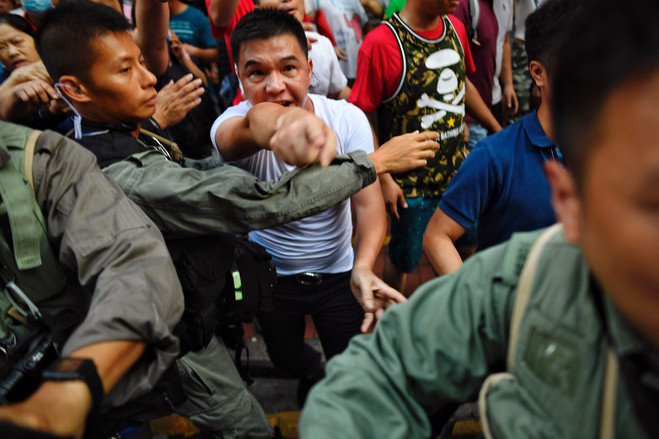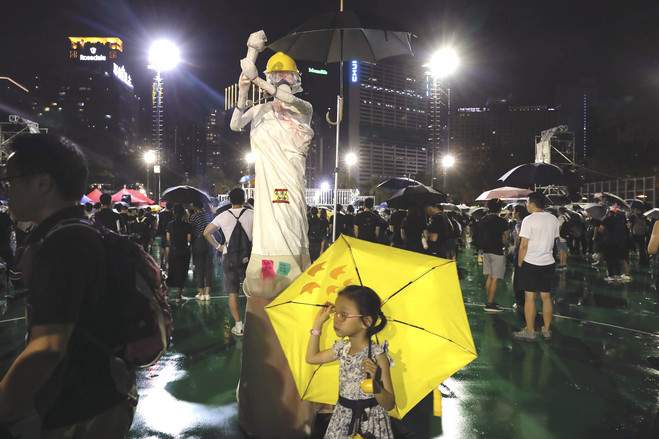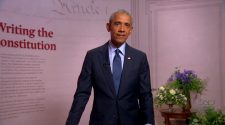HONG KONG—On June 16, a 24-year-old female graduate student with the family name Chen donned a black T-shirt, grabbed a surgical mask in case she needed to hide her face, and joined a massive march against further erosion of the city’s freedoms by China.
That much was standard procedure for many of the estimated two million people who took to the streets that day. What set her apart was her Chinese passport.
More than one million people have moved from mainland China to live, work and study in Hong Kong since 1997, when the U.K. handed over the city’s sovereignty to Beijing. Many of them share the antipathy for the protesters expressed by state-media portrayals across the border. Some, like a group of immigrants from Fujian province in the city’s North Point neighborhood, even fought against the protesters, answering a call from Beijing.
But a small cohort of mainlanders have joined the demonstrations, taking extraordinary risks to support a society that offers freedoms unavailable back home.
“My understanding is that ‘one country, two systems’ is a creative set of ideals,” Ms. Chen said. “Now those ideals are threatened.”
In more than a dozen interviews, these outliers said they value Hong Kong’s autonomy from Chinese control, especially when it comes to the city’s legal system and freedom of expression. They have joined marches, signed open online letters supporting Hong Kong and defended the movement in social-media battles against state-backed critics and misinformation.

Photo:
manan vatsyayana/Agence France-Presse/Getty Images
Those actions put them at risk of detention by Chinese authorities, who are checking travelers’ smartphones at the border crossing to Shenzhen for evidence of participation in the demonstrations. Mainlanders living in Hong Kong have also experienced ostracism from friends back home who see the protesters as a violent fringe, especially after they beat up a pair of mainland citizens in a melee at the airport. The incident set off a wave of anger in China and a bout of soul-searching among the protesters.
Ms. Chen has taken precautions beyond not giving her full name, particularly avoiding protests that clash with the police. But until now she has kept the mask in her bag, calculating her face would be lost in the sea of protesters.
Every year thousands of mainland students come for schooling to Hong Kong, where many have their political views remolded. The city hosts a candlelight vigil every June 4 to commemorate the 1989 massacre of students protesting around Beijing’s Tiananmen Square, an episode that has been distorted in China’s history books. Uncensored books about China can be found in Hong Kong. And in 2014, students led a protest that occupied downtown Hong Kong for 79 days, an action that would have been unthinkable in China.

Photo:
Anthony Kwan/Getty Images

Photo:
Kin Cheung/Associated Press
Ms. Chen arrived to study at a local university in time for that protest, which became known as the Umbrella Movement. Many Hong Kong students said mainlanders were brainwashed intruders and called them locusts, sentiments that have persisted over time.
Her parents warned her that Hong Kong had no future and urged her to come home after graduation. Instead, she drilled into the history of the Tiananmen Square massacre and felt gloomy that something like that could happen in her homeland. This year, she attended the June 4 vigil marking the event’s 30th anniversary and said she was awed that the 180,000 participants left no garbage. It was the first time she had ever attended the annual commemoration.
She also read up on the bill that would have allowed Hong Kong to extradite criminal suspects to China and have them subjected to its opaque judicial system. After a June 9 march against the bill drew an estimated one million people into the streets, Ms. Chen said she was disturbed to read a Chinese state newspaper article that said the bill enjoyed wide support and made no mention of the protest.
Share Your Thoughts
What are your thoughts on migration to support a movement? Would you do it? Join the conversation below.
“I was more agitated by that than the bill itself,” said Ms. Chen, who went into the streets herself the following weekend, though she has steered clear since then as clashes between police and protesters have escalated.
Many Hong Kongers have feared that a recent influx of mainlanders since the 1997 handover would forever alter the city’s character. But Hong Kong’s way of life has proved persuasive, too.
A 47-year-old housecleaner with the surname Lam, who came to Hong Kong 15 years ago from southern China, never went out to march. But her teenage son did, she said, and after several heated discussions, he persuaded her to oppose the extradition bill that sparked the protests.
“I grew up with no freedom of speech, and I didn’t care if the law is passed,” Ms. Lam said. “But he is free to say anything now and wouldn’t get used to it.”
Ms. Lam considers herself patriotic. Her parents are Communist Party members who still live in China. But now she says she sees things in a new light.
“My heart aches,” she said. “Why has my country become so rich, yet its human-rights record is still so bad?”
Betty Xu,
a mainland citizen who has stayed on in Hong Kong since graduating from a local university this summer, has joined several protests and posted photos of them on the Chinese messaging service WeChat.
Some of her childhood friends back home saw those posts and accused her of having been brainwashed by Hong Kong. After one old friend called Hong Kong a British dog, she says, she deleted him from her contacts, along with 100 others who she wasn’t sure she could trust.

Photo:
Nicole Tung for The Wall Street for The Wall Street Journal
The 22-year-old woman felt a wave of terror after seeing what happened to
Chen Chun,
a Shenzhen-based scholar who posted a photo of himself dressed in a mask and black T-shirt on his private WeChat timeline after joining a march in Hong Kong. Someone reposted the photo on the public messaging service Weibo, and it went viral—with him cast as villain. People labeled him a traitor and reported him to mainland police, who interrogated him late into the night, he said.
After the Aug. 13 airport incident in which protesters violently turned on two mainland men they accused of being infiltrators, Ms. Xu watched with disbelief as her WeChat feed exploded. She says she spent a sleepless night desperately trying to make sense of the incident. The beating was wrong, she decided, but the fundamental justification for the protests was unchanged.
On Aug. 18, Ms. Xu joined as many as 1.7 million people marching peacefully in the rain, showing solidarity as the protests entered their 11th week.
“I’m more than before touched by the Hong Kong people, who remained united after so much had happened,” Ms. Xu said. “That’s why I’m staying with them.”
Write to Wenxin Fan at [email protected]
Copyright ©2019 Dow Jones & Company, Inc. All Rights Reserved. 87990cbe856818d5eddac44c7b1cdeb8


















